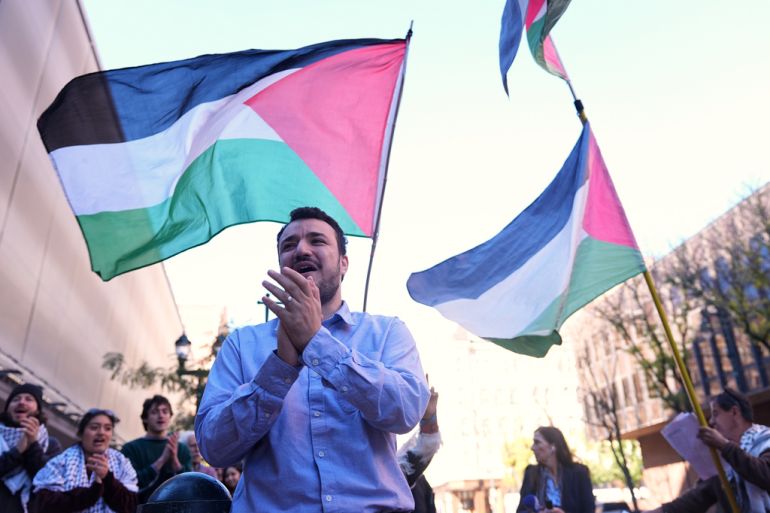Lawyers urge US appeals court to uphold Mahmoud Khalil’s release order
Targeted for participating in pro-Palestine protests at Columbia, Khalil says his case is ‘test for everyone’s rights’.

 Published On 21 Oct 202521 Oct 2025
Published On 21 Oct 202521 Oct 2025
Save
Lawyers for Mahmoud Khalil have asked appeals judges in the United States to keep in place a lower court’s order that freed the Palestine solidarity activist from immigration detention.
Khalil – whom the US government is trying to deport over his activism at Columbia University last year – told supporters outside the courtroom in Philadelphia after the hearing on Tuesday that his case is proving to be a “test for everyone’s rights”.
Recommended Stories
list of 3 itemsend of list
He suggested that there “is no immediate risk” of his being re-detained.
“Nothing should deter anyone from speaking out for the liberation of Palestine, for the rights of immigrants everywhere,” Khalil said.
Government lawyers are trying to get a three-judge panel on the court of appeals to reverse the decision to free him, arguing that the federal district court in New Jersey that granted his release lacked jurisdiction in the case.
Khalil, who is a legal permanent resident, was the first prominent Palestinian rights advocate to be detained and have his immigration status challenged over campus activism.
The administration of President Donald Trump has said that it targeted hundreds of students for deportation, accusing them of supporting “terrorism” and spreading anti-Semitism – accusations that the activists deny.
To legally justify the crackdown, the Trump administration has been invoking an immigration law provision that grants the secretary of state the power to deport non-citizens whose presence in the country has “adverse foreign policy consequences” for the US.
Advertisement
Bobby Hodgson, assistant legal director at the New York chapter of the American Civil Liberties Union (ACLU), told reporters at a virtual briefing on Tuesday that the government’s assertion of broad deportation powers on foreign policy grounds is “wrong” and “unconstitutional”.
“What our arguments really boil down to is that, in the United States, ideas are not illegal, and the government cannot weaponise a vague immigration law to incarcerate or remove people for expressing opinions with which they disagree,” said Hodgson.
Khalil was arrested by immigration authorities in March and missed the birth of his first child while in a detention centre in Louisiana.
The court decision to release Khalil in June did not conclude his immigration case. It was related to a legal petition challenging his detention, known as habeas corpus.
The deportation case is proceeding through a separate process in the immigration system.
The US government has also accused Khalil of concealing his work for the United Nations agency for Palestinian refugees (UNRWA) on his visa and Green Card applications to bolster the deportation case.
Last month, an immigration judge sided with the government in ordering the removal of Khalil from the country.
Immigration judges work within the executive branch and do not represent independent courts like the constitutional judicial system.
Khalil’s immigration case is now being appealed to an administrative body called the Board of Immigration Appeals.
If the board affirms the immigration judge’s ruling, the decision is likely to be appealed to a circuit court – part of the normal judicial system – on constitutional grounds.
With both the habeas corpus petition and the immigration case facing appeals from both sides, the legal saga is not likely to conclude any time soon.
But for now, Khalil and many others in the same situation remain free due to decisions by district courts.
In a separate, broader case, a US judge found last month that the Trump administration’s crackdown on Palestine solidarity activists was unlawful, as it aimed to silence criticism of Israel, violating constitutionally protected free speech rights.
“We are not, and we must not become, a nation that imprisons and deports people because we are afraid of what they have to tell us,” Judge William Young wrote in his ruling.
